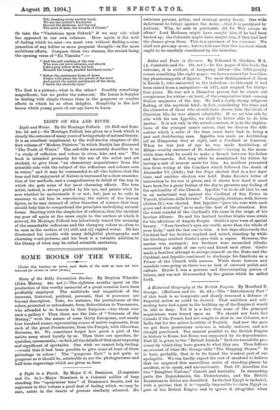Dukes and Poets in Ferrara. By Edmund G. Gardner, M.A.
(A. Constable and Co. 18s. net.)—In the pages of this book, the outcome, it is evident, of unsparing labour—the bibliography covers something like eight pages—we have a somewhat bewilder- ing phantasmagoria of figures. The most distinguished of them is Ercole I., who succeeded to the dukedom—to this rank it had been raised from a marquisate—in 1471, and reigned for thirty- four years. He was not a blameless person, but he stands out conspicuous for virtue—at least, of the comparative kind—among Italian magnates of the day. He had a really strong religious feeling, of the mystical kind ; in fact, considering the time, and the character of those who should have shown him the ideals of Christian life, he was almost admirable. If we set him side by side with his son Ippolito, we shall be better able to do him justice. It is not only in the actual contrast, it is in the implica- tions of the younger man's career, that we discern the diffi- culties which a ruler of the time must have had in being a just and God-fearing man. Ippolito was made an Archbishop (of an Hungarian See) at eight, and a Cardinal at fourteen. When he was just of age he was made Archbishop of Milan—worthy successor of St. Ambrose !—having in the mean- while done what he could to make a breach between his father and Savonarola. Not long after he scandalised his father by having a suit of armour made for him. An accident prevented him from voting at the Conclave which followed the death of Alexander VI. (1503) ; but the Pope elected died in a few days, time, and another election was held. Duke Ercole's letter of instruction to his son is given, and it shows how hard it must have been for a great Italian of the day to preserve any feeling of the spirituality of the Church. Ippolito "is to do all that lie can in an underhand way against the Cardinal of San Pietro in Vincoli, Giuliano della Revere." Unhappily, Giuliano della Rovere (Julius IL) was elected. But Ippolito "gave his vote with such grace and dexterity" as to make the best of the situation. But the worst scandal of the Cardinal's life came in the reign of his brother Alfonso. He and his bastard brother Giulio were rivals for the affections of Angela Borgia. Giulio's eyes were of special beauty. "Your brother's eyes are worth more than the whole of your body," said the fair one to him. A few days afterwards the Cardinal had his brother waylaid and seized, standing by while his hirelings stabbed Giulio's eyes with a rapier. However, the matter was arranged ; the brothers were reconciled (Giulio recovered the sight of one eye) and kissed each other. Giulio made a fruitless attempt to avenge himself on the Duke and the Cardinal, and Ippolito continued to discharge his functions as a Prince of the Church with success. While these horrors and scandals were going on there was no lack of outward polish and culture. Ercole I. was a genuine and discriminating patron of letters, and was not ill-rewarded by the genius which he called forth.


































 Previous page
Previous page